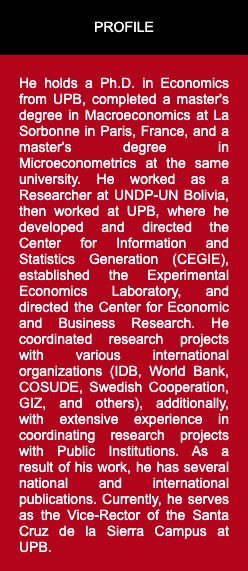Vesna Marinkovic U.
The UPB is spearheading research in technologies related to the development of lithium batteries and is working in deserts and salt flats to develop technologies that combat soil desertification, emphasizes the Vice-Rector of the Santa Cruz de la Sierra Campus.
1UPB is venturing into technologies related to the development of lithium batteries through research. How did this initiative come about, and what is its scope?
Indeed, Bolivia has one of the world’s largest lithium reserves, presenting a significant opportunity for the country in terms of economic and technological development. Lithium, being a key element in rechargeable batteries, is a strategic resource for the technology industry.

“In the Bolivian professional life, it is perceived that AI applications have allowed for improved efficiency at work, especially in large companies…”
UPB students are being trained in lithium battery-related topics through a partnership with QUANTUM, with the aim of enhancing their efficiency through various tests involving heat, temperature, and humidity. It’s crucial to be aware that lithium is a non-renewable resource, making responsible and sustainable exploitation essential to ensure its long-term availability. At UPB, across our various engineering research centers, we encourage the research and development of such technologies and any opportunity to advance the country.
2Does this mean that the academy is working to offer development proposals to the country?
Absolutely, and with great enthusiasm. UPB is committed to educating professionals who can make a positive impact on the country’s development.
3What does this initiative imply in terms of investment and infrastructure?
The growth and development UPB is experiencing across its different campuses, along with the need to advance in new careers, new technologies, and research, lead us to invest in new technological equipment and infrastructure.
In the Santa Cruz campus, we have started the construction of a building that will house engineering labs and related research centers. In the Cochabamba JLP campus, the investment is focused on upgrading the current laboratory infrastructure and constructing a new building. In the La Paz FIR campus, the investment will be directed towards new equipment for engineering laboratories and research centers.

4UPB is also working in deserts and salt flats to develop technologies to combat soil desertification. Can you provide details?
At the UPB Bioengineering Research Center, we are investigating how microorganisms are affected by water stress and climate change.
Microorganisms play a fundamental role in maintaining soil quality, crucial for various human activities, primarily agriculture. They undergo changes in their metabolism due to water stress, and we plan to detect these changes using environmental DNA technology, bioinformatics, and data science initially. However, we also consider developing rapid molecular detection methods for soil quality, similar to real-time PCR used to detect COVID.
In this context, salt flats play a significant role as a study model, as their biodiversity is adapted to water scarcity. Extreme water stress will not eliminate their microorganisms, but induce them to change survival strategies, detectable through molecular techniques. Our research focuses on the country’s deserts but can be extrapolated to any ecosystem experiencing drought.
5What are the new careers that the University is incorporating, and what are their projections?
The new careers are Bioengineering and Data Managerial Analytics (better known as Data Science). In the case of Bioengineering, we have identified a significant demand in the country and worldwide for professionals with knowledge of the latest advances in molecular biology and the use of metabolic processes in organisms to obtain technological products applied to the development of pharmaceuticals, agriculture, food, among others.
Currently, in all economic, business, social, and other activities, professionals are needed to help make optimal managerial decisions based on information. In this regard, in the Data Managerial Analytics career, we will train professionals with knowledge of new technologies that enable the processing of large volumes of information, the development of sophisticated algorithms for information analysis, and the visualization of this information. This knowledge will be complemented with the development of managerial skills to make intelligent, optimal, and timely decisions based on data.
6UPB has developed various courses on Artificial Intelligence. What is the evaluation regarding their application in classrooms and professional life in Bolivia?
Through Continuous Training, a total of 13 courses in 27 versions related to the application of AI tools have been provided, reaching a total of 607 trained individuals in the last 6 months. In undergraduate and postgraduate courses, professors encouraged students to apply AI tools.
Successful applications of AI have been achieved in various fields of knowledge in training students. UPB, through its AI Research Center, is working on the development of tools with various applications.
In the Bolivian professional environment, AI applications are perceived to improve efficiency in work, especially in large companies. For example, in customer service, marketing, finance, and data analysis, while in other areas, there is still a superficial application, mainly of Chat GPT, and there may be significant opportunities. In terms of AI tool development in the country, it is still in its early stages.

